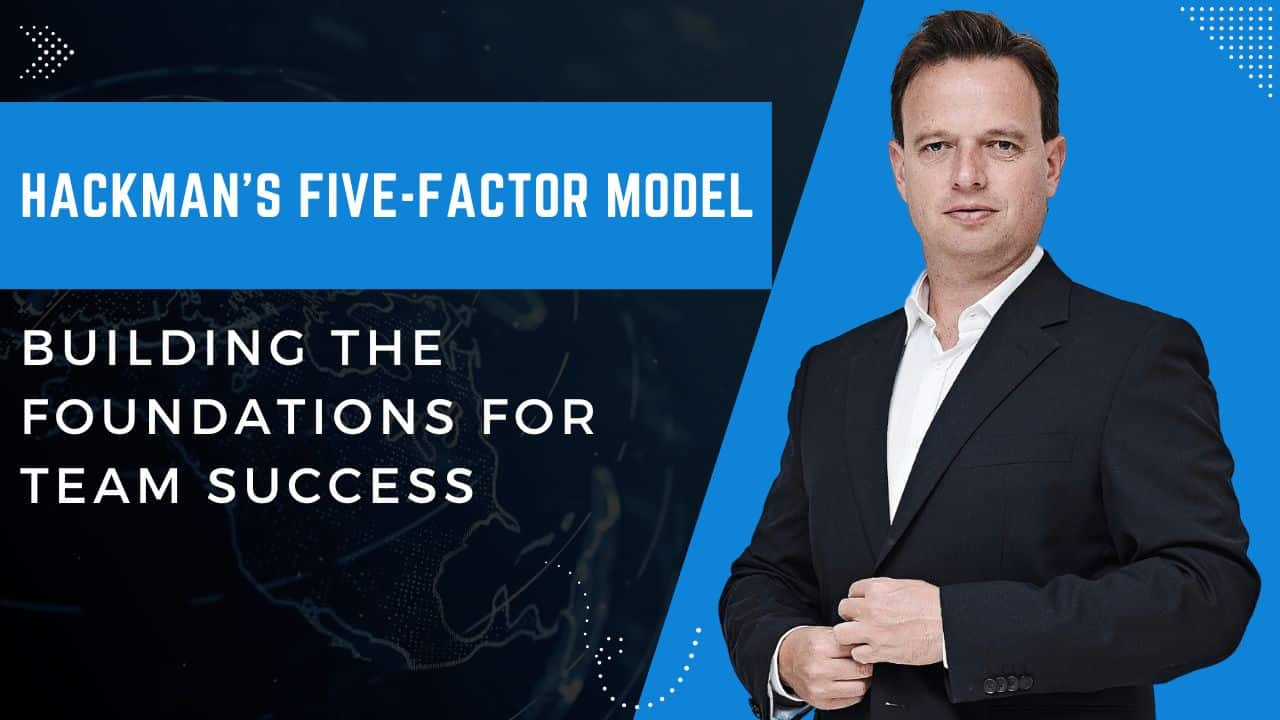Hackman’s Five-Factor Model of Effective Teams provides a framework for understanding what makes a team successful.
It remains widely cited and relevant, particularly in the context of modern, complex, and cross-functional teams.

In this week’s article, I’m sharing a powerful workshop designed to help teams strengthen their foundations using proven principles from team development research.
Whether you’re leading a team or part of one, creating an environment where people collaborate effectively isn’t just a nice-to-have—it’s essential for achieving meaningful results.
Yet, most teams fall short because they lack clarity about their goals, roles, and resources, or they fail to address the interpersonal dynamics that drive long-term success.
"Great teams don’t happen by accident—they are intentionally designed, thoughtfully led, and continuously improved.”
Here’s a simple, half-day workshop designed around the insights from Hackman’s Five-Factor Model.
It helps teams evaluate their effectiveness, clarify goals, and build structures for success.
The workshop gives you:
- A clear framework for understanding what makes teams effective.
- Practical tools to identify and address your team’s unique challenges.
- An action plan that leads to real improvements.
- Insights into how strong teams build not just results but trust and cohesion.
Let's get into it...
"Building the Foundations for Team Success with Hackman’s Five-Factor Model"
Objective
Equip the team with a shared understanding of Hackman’s Five-Factor Model and collaboratively apply its principles to enhance team performance.
Agenda Overview
- Welcome & Introduction (15 mins)
- Understanding the Five-Factor Model (20 mins)
- Self-Assessment: How Are We Doing? (30 mins)
- Team Discussions and Action Planning (90 mins)
- Reflection and Commitments (30 mins)
Process
1. Welcome & Introduction (15 mins)
- Welcome participants, outline the agenda and objectives. Set a collaborative tone.
- Icebreaker: “What’s one thing that makes you proud of being part of this team?”
2. Understanding the Five-Factor Model (20 mins)
- Present each factor with real-world examples:****
- 1. A Real Team: Stable, clearly defined boundaries, shared identity.
- 2. Compelling Direction: Clear, challenging, and meaningful goals.
- 3. Enabling Structure: Well-defined roles, norms, and balanced skills.
- 4. Supportive Context: Access to resources, information, and rewards.
- 5. Expert Coaching: Timely support to enhance performance and growth.
- Activity: Small groups briefly discuss how they think each factor applies to their team.
3. Self-Assessment: How Are We Doing? (30 mins)
- Provide the team with a self-assessment worksheet:
- Each person rates each factor on a scale of 1–5 (1 = poor, 5 = excellent).
- Add brief comments about strengths and gaps for each factor.
- Debrief: Share highlights as a group. Discuss where the team excels and where improvement is possible/needed.
4. Team Discussions and Action Planning (90 mins)
- Divide the team into small groups. Assign each group one or two factors to focus on.
- Discussion Prompts:
- What are we doing well in this area?
- What specific improvements can we make?
- What actions will create the most impact?
- Output: Each group creates a brief action plan for their assigned factors. Action plans should include:
- One immediate action (within 1 week).
- One medium-term goal (1–3 months).
- Groups present their plans to the team for feedback and alignment.
5. Reflection and Commitments (30 mins)
- Activity: Write a "Commitment Card":
- Each participant writes one action they will personally take to support the team’s development.
- Group Reflection:
- What’s the most important insight you gained today?
- What excites you most about our action plans?
- Facilitator Wrap-Up: Summarise key points, thank participants, and outline next steps (e.g., follow-up check-ins, implementation tracking).
Expected Outcomes
- A shared understanding of Hackman’s Five-Factor Model.
- Clear identification of strengths and areas for improvement.
- Actionable plans to enhance team performance.
- Strengthened team commitment and alignment.
Conclusion
Hackman’s model emphasises that team success is rarely accidental.
Instead, it results from intentional design, leadership, and continuous improvement.
When you create the right conditions (real team, compelling direction, enabling structure, supportive context, and expert coaching), organisations maximise team effectiveness.
By using this workshop, you’ll never have to struggle with vague goals, unclear roles, or unproductive meetings that drain your team’s energy and potential.
Instead, it becomes a simple process of identifying strengths, addressing challenges, and creating actionable plans that empower your team to collaborate with clarity and purpose.
See you next week.

